Welcome HSC Graduate Students
Each year around this time, the hustle and bustle returns to Gainesville: more traffic, busier restaurants, an influx of enthusiastic students, and, of course, the start of the football season. In other words, another academic year has begun. Classes are in session.
Although the bulk of students at UF are undergraduate and graduate students on the “main campus,” the Health Science Center is home to a substantial set of educational programs across our six colleges and campuses in Gainesville and Jacksonville. All told, the Health Science Center has 6,572 undergraduate, graduate and professional students, plus 1,214 residents and fellows.
Some of these programs begin July 1, most notably our graduate medical education programs. The experience of new interns was highlighted in two previous issues of OTSP ("When I was an intern, Parts 1 and 2," July 3 and July 10, 2013). Our other educational programs, however, begin in late August, in concert with the university’s academic calendar. Previous issues of OTSP have focused on HSC professional students across all colleges ("Our Health Science Center Students,” Nov 3, 2009 and “Welcome new HSC students” Sept 10, 2010), and on undergraduates in the College of Public Health and Health Professions (Bachelor of Health Science Program, April 2, 2014). In this issue of OTSP, we focus on graduate education.
There is probably no educational category at UF that contributes more to academic reputation than graduate education. Graduate students create a vibrant intellectual environment, pose probing questions that frame new directions for investigation, contribute actively to research projects resulting in manuscripts and grants, and become integral to our educational programs as teaching assistants and in other roles. Therefore, in our quest to rise to preeminence as a university, there is no more important set of educational programs to nurture and spur to excellence than our graduate education programs.
At the HSC, we have traditional Ph.D. programs focused on research, but also have a variety of master’s and non-Ph.D. doctoral programs that emphasize clinical specialization and scholarship without a main focus on research. In this newsletter, we present an overview of the graduate programs in the six HSC colleges, with a biosketch of one or two students that describes their backgrounds, the roots of their interest in their chosen fields and their career goals. You will no doubt be impressed by the diversity, breadth and excellence of our graduate students.
College of Dentistry
During the past 10 years, the number of dental students who continue their education to earn a master’s degree has grown nationally. The UF College of Dentistry, through the School of Advanced Dental Sciences, offers four specialty programs for students to obtain a master’s degree: endodontics, orthodontics, periodontology and prosthodontics. Currently there are 38 enrolled Master of Sciences advanced education students; 13 of these began their advanced education this semester.
Our residents have received local and national awards for their research efforts, thanks to collaboration between the colleges and the Health Science Center. One award was for a collaboration with the UF College of Medicine on a project titled “Presence of Metastatic Human Osteosarcoma Cells in the Dental Pulp.” Another award was for a study titled “Quantitative Analysis of the Antimicrobial Efficacy of Two Irrigation Protocols,” which entailed a collaboration with the Department of Oral Biology. Several other basic science and clinical translational studies received awards for studies in the fields of diabetes, trauma, systemic diseases, implants and resorption.
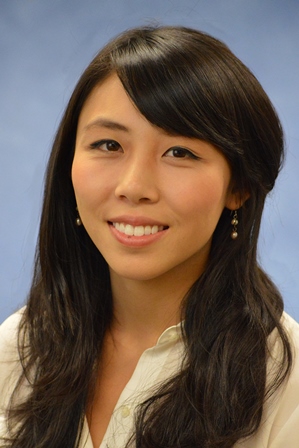 Audrey Hsin, D.D.S., joined four other students in August who are pursuing specialty training in endodontics, which is the dental specialty concerned with the study and treatment of the dental pulp (i.e., the tissue that occupies the central cavity of a tooth). Besides “root canal therapy,” which is done to save a tooth when the pulp becomes inflamed or infected, endodontists help patients with a variety of other problems, including the treatment of cracked teeth and dental trauma. Some endodontics residents are students with a few years of private practice experience who later decide to specialize in one area of dentistry, and some are students who decide to specialize immediately after they earn their dental degree.
Audrey Hsin, D.D.S., joined four other students in August who are pursuing specialty training in endodontics, which is the dental specialty concerned with the study and treatment of the dental pulp (i.e., the tissue that occupies the central cavity of a tooth). Besides “root canal therapy,” which is done to save a tooth when the pulp becomes inflamed or infected, endodontists help patients with a variety of other problems, including the treatment of cracked teeth and dental trauma. Some endodontics residents are students with a few years of private practice experience who later decide to specialize in one area of dentistry, and some are students who decide to specialize immediately after they earn their dental degree.
Dr. Hsin is of Chinese descent and was born in Canada. She completed her dental degree in New York in May and, after volunteering long hours at an emergency clinic on evenings and weekends, she became passionate about helping relieve patients’ pain. She applied to several endodontic residency programs and chose the University of Florida because of the strong balance between the clinical and academic experiences offered in the program, plus the added benefit of being able to obtain a master’s in science so she can pursue her goal of becoming an academician later in her career.
College of Medicine
The education of biomedical scientists, clinical and translational investigators and health care leaders of the future is one of the core missions of the University of Florida College of Medicine. Graduate students contribute greatly to the intellectual vitality and research programs within the college and are frequently “pushing the envelope” of innovation. The COM enrolls approximately 40 Ph.D., five M.D./Ph.D., more than 20 master’s degree and 60 master’s of physician assistants studies students each year into its graduate programs.
The Interdisciplinary Program in Biomedical Sciences at the COM is a doctoral program in medical science with a mission to prepare research investigators and scholars for a wide range of careers in biomedical science. The curriculum is designed to provide maximum flexibility while promoting biological literacy and scholarship through core and advanced curricula and mentored original research. Eight basic science departments, which include faculty from the College of Dentistry, cooperate in the recruitment, admission and training of graduate students, followed by specialized training via seven advanced interdepartmental graduate concentrations. Doctoral programs offered by the departments of health outcomes and policy, epidemiology and biostatistics provide additional advanced training in medical science, population health and health services research in a range of biomedical, clinical and community settings. Students admitted to the M.D./Ph.D. integrated program graduate with both medical and doctoral degrees after approximately eight years of study. The university recently recognized the COM biomedical sciences program as one of its strongest graduate programs, noting excellent mentoring and a relatively short average time (5.5 years) to doctoral degree completion.
Multiple Master of Science programs are offered by the COM. These are typically two-year structured programs with a research component and include medical science, translational biotechnology (an interdisciplinary program involving biosciences and business), clinical and translational science, health outcomes and policy, biostatistics and epidemiology. Many of these programs have been developed in the past 10 years to meet the evolving biomedical science and health care needs of the country.
The School of Physician Assistant Studies established its two-year professional master’s degree program in 1996. This highly competitive program is designed to educate and prepare graduates to transition directly into clinical practice as part of a multidisciplinary health care team.
An expanding area of graduate education is the offering of Certificate Programs. During the past four years, several departments have developed certificate programs to meet the need for advanced specialized training and are available to learners and professionals at all levels. Typically these programs require completion of four to eight courses in a focused area of study. Many of these programs are offered online as part of COM distant education initiatives.
Caesar Hernandez, M.S., heard the call of duty after the Sept. 11 terrorist attacks and answered it by joining the U.S. Marine Corps upon graduating high school in 2003.
After completing tours in Haiti and Iraq, he returned to South Florida in 2007 to earn bachelor’s and master’s degrees from Florida Atlantic University.
Today, Hernandez, 30, is pursuing a doctorate in biomedical sciences as a Tillman Military Scholar and McKnight Doctoral Fellow at the UF College of Medicine. He hopes to apply critical thinking to key research questions and to leave his mark on science through his interests in memory, aging and the nervous system, as well as in related disorders such as Parkinson’s disease and Alzheimer’s disease.
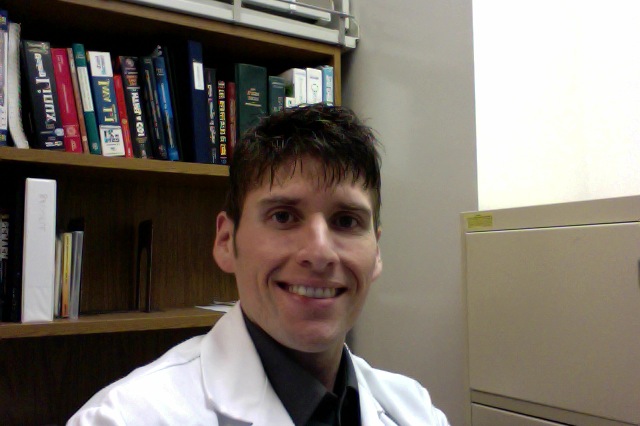 “When I went into the Marine Corps, that’s the feeling I had — to give back, to do something for the greater good,” he said.
“When I went into the Marine Corps, that’s the feeling I had — to give back, to do something for the greater good,” he said.
Hernandez credits his military service for teaching him discipline, focus and tenacity. These skills are serving him well in his pursuit of his educational and professional goals, which include working at the National Institutes of Health and training future scientists.
“Ultimately, I’d like to come back to academia,” he said, “so I can transfer whatever knowledge I may have gained throughout the years to the younger generations.”
College of Nursing
The College of Nursing enrolls more than 1,000 students in its degree programs, which include its Ph.D. degree, Doctor of Nursing Practice degree, certificate program and bachelor’s degree. Fall enrollment in the college’s graduate-level programs is 415 students. About 30 percent of the College of Nursing’s graduate students are members of minority groups, including 6 percent Asian, 9 percent African-American/Black, 9 percent Hispanic and 6 percent other ethnic minorities. Nearly 175 first-year graduate students are joining us this fall.
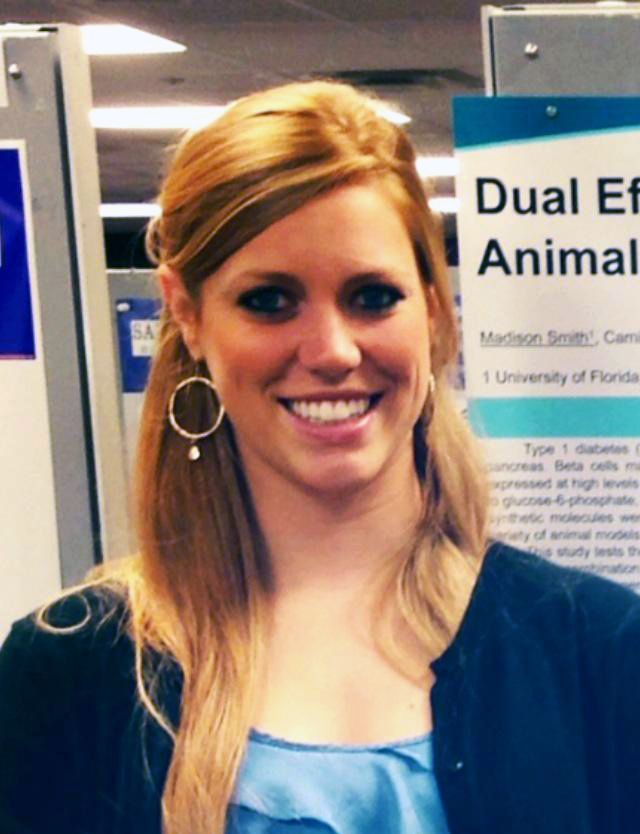 The Ph.D. of Nursing Sciences program prepares scientists, scholars and leaders in nursing. Comprehensive research preparation is achieved by pairing students with faculty researchers.
The Ph.D. of Nursing Sciences program prepares scientists, scholars and leaders in nursing. Comprehensive research preparation is achieved by pairing students with faculty researchers.
An Oviedo native, Madison Smith’s journey to pursue her Ph.D. in nursing began when she was diagnosed with Type I diabetes at the age of 16. She was assigned nurse educators who personalized her care and made sure she was adhering to her care plan. It was then that she knew she wanted to pursue nursing. As an undergraduate student in UF’s nursing program, her passion to pursue research into Type I diabetes was born.
Smith began as a research assistant in the college’s research office and then was awarded an internship through the National Science Foundation while on summer break. Her research focuses on the aggressive autoimmunity causing development of Type I diabetes. She continued that research while in the college’s honors program and currently works at the UF Diabetes Center for Excellence as a clinical research coordinator. She is excited to pursue her Ph.D. because it will give her the degree necessary to practice research at the most advanced level that will hopefully lead to a cure for Type I diabetes.
The Doctor of Nursing Practice degree is a practice-focused doctorate designed to prepare expert nurses in specialized advanced practice. The focus of the D.N.P. program is on innovative and evidence-based practice. Students end their program by participating in a final capstone project that focuses on advancing practice and patient care.
 Incoming Doctor of Nursing Practice student Lajuan Sanchez has lived in Florida her whole life and served in the U.S. Army for a little over five years, deploying to Baghdad for one of those and Seoul, Korea for two. After returning home she pursued her dream of a nursing career and obtained her bachelor’s degree in nursing in May 2013. She currently works at Tampa General Hospital in the medical intensive care unit, where she also completed a critical care internship
Incoming Doctor of Nursing Practice student Lajuan Sanchez has lived in Florida her whole life and served in the U.S. Army for a little over five years, deploying to Baghdad for one of those and Seoul, Korea for two. After returning home she pursued her dream of a nursing career and obtained her bachelor’s degree in nursing in May 2013. She currently works at Tampa General Hospital in the medical intensive care unit, where she also completed a critical care internship
During her clinical experiences on a labor and delivery unit as an undergraduate student, she had the special privilege of witnessing a birth and observing the joy of bringing life into the world — something she experienced personally when she had her son. She is confident that her rigorous curriculum in UF’s D.N.P. program will prepare her for advanced practice and a career as a nurse midwife, where she hopes to care for patients of military families at bases around the globe.
College of Pharmacy
The College of Pharmacy offers residential and online graduate programs in specialized areas of the pharmaceutical sciences. Currently, 101 graduate students are enrolled in a residential program in one of these areas; medicinal chemistry, pharmacodynamics, pharmaceutical outcomes and policy, pharmaceutics, or clinical pharmaceutical science. Of these students, 91 are pursuing a Ph.D., 10 are pursuing a master’s degree, and 23 are fall 2014 new admissions.
The average time to degree is 4.5 years for Ph.D. students and nearly three years for master’s students. In the last two academic years, the college has graduated 31 Ph.D. and seven M.S. students. The employment trends remain consistent, with about 25 percent of graduates going to academia, 33 percent to industry, 18 percent to postdoctoral positions, and 8 percent to government positons — including a high number employed by the FDA. The college offers a number of online programs leading to the M.S. degree that together currently enroll 510 students nationally and internationally in several areas, including the UF online Forensic Science Program, the largest graduate forensic program worldwide; sister programs in pharmaceutical chemistry and clinical toxicology; an online Master of Science in Pharmacy program with a concentration in pharmaceutical outcomes and policy and specialty tracks in pharmaceutical regulation, applied pharmacoeconomics, and patient safety in medication; an online Master of Science in Pharmacy in Medication Therapy Management, designed for working professionals who wish to gain innovative patient care and business skills needed to become a leader in the field of medication therapy management; and a new online M.S. in Clinical Pharmacy program, which is being launched this year to expand patient care skills to international pharmacists primarily trained in drug chemistry.
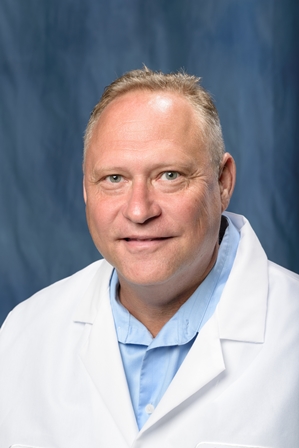 This fall, Brian McMillan is a new doctoral student in the college’s department of medicinal chemistry, studying under the mentorship of Hendrik Luesch, Ph.D., an associate professor and director of the Center for Natural Products, Drug Discovery and Development. McMillan has served as vice president of a contract research organization since 2006, working in pharmaceutical formulation development. He earned a bachelor’s in biochemistry at The Ohio State University, but it was after completing the UF online master’s in pharmaceutical chemistry program through the College of Pharmacy in 2013 that his interest grew to advance his graduate training in medicinal chemistry to the next level.
This fall, Brian McMillan is a new doctoral student in the college’s department of medicinal chemistry, studying under the mentorship of Hendrik Luesch, Ph.D., an associate professor and director of the Center for Natural Products, Drug Discovery and Development. McMillan has served as vice president of a contract research organization since 2006, working in pharmaceutical formulation development. He earned a bachelor’s in biochemistry at The Ohio State University, but it was after completing the UF online master’s in pharmaceutical chemistry program through the College of Pharmacy in 2013 that his interest grew to advance his graduate training in medicinal chemistry to the next level.
In his research training at UF, McMillan will continue ongoing work in the Luesch lab related to seaweed extracts with antioxidant and anti-inflammatory activities. His work will focus on the development of these natural products for preventive use as suppressors of cancer and inflammatory and degenerative diseases. In gaining research training in drug development at UF, McMillan is excited to be in a collaborative health sciences environment that will prepare him for the process of bringing improved drugs to patients who need them.
College of Public Health and Health Professions
The College of Public Health and Health Professions enrolls more than 2,000 students in its degree programs, which include seven Ph.D. degrees, two professional doctoral degrees, seven master’s degrees, one bachelor’s degree with two majors and nine certificate programs. Fall enrollment in the college’s graduate-level programs is 736, with students ranging in age from 20 to 60. About 30 percent of PHHP’s graduate students are members of minority groups, including 8 percent Asian, 10 percent African-American/Black and 10 percent Hispanic. Nearly 200 first-year graduate students are joining us this fall. Here we highlight two of them:
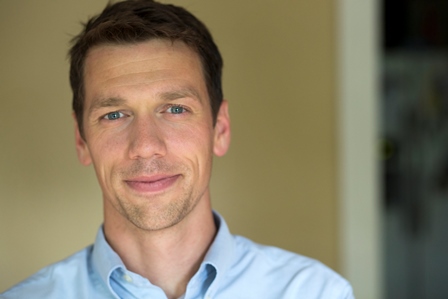 Joseph Brew may be a native Gainesville son, but he traveled the world over before finding himself back home, pursuing a UF doctoral degree in epidemiology.
Joseph Brew may be a native Gainesville son, but he traveled the world over before finding himself back home, pursuing a UF doctoral degree in epidemiology.
After completing a triple major in contemporary history, French and Spanish at the University of the South in Tennessee, Brew earned a master’s in contemporary diplomatic history from the Institut Catholique de Paris in France. Summers spent teaching in Guatemala and Togo convinced him to redirect his focus toward public health. He received a master’s in public health at the Escuela Andaluza de Salud Publica in Spain and Kobenhavns Universitet in Denmark.
During his M.P.H. practicum, Brew spent a few months working in northern Ethiopia, near the Eritrean border. He says the experience helped confirm two truths: that public health can be very complicated, and that he was very ignorant. So, he is pursuing a Ph.D. to “cure” his ignorance and sharpen his skills.
Brew has been impressed with his program’s enthusiastic professors, beautiful facilities, helpful staff and most of all, his classmates, many of whom hail from locations all over the world. He looks forward to learning from both his instructors and his fellow classmates.
A few years ago Lorie Nance, a student in the master’s in public health degree environmental health track and a U.S. Navy environmental health officer candidate, began dreaming of a path that would enable her to go back to school, pursue a health career and become a naval officer.
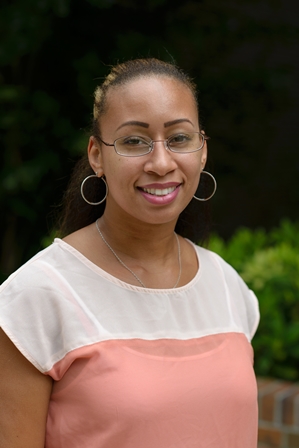 After learning about the Navy’s environmental health officer program, Nance believed she’d found the perfect fit for her goals and interests. She applied simultaneously to the M.P.H. program and the Navy’s Health Service Collegiate Program, which provides financial support for her education. Now she’s right where she wants to be: gaining public health knowledge at UF that she will put to work as an officer in the Navy Medical Service Corps after she graduates.
After learning about the Navy’s environmental health officer program, Nance believed she’d found the perfect fit for her goals and interests. She applied simultaneously to the M.P.H. program and the Navy’s Health Service Collegiate Program, which provides financial support for her education. Now she’s right where she wants to be: gaining public health knowledge at UF that she will put to work as an officer in the Navy Medical Service Corps after she graduates.
Nance chose the UF program because of the opportunities it will provide her to prepare for real-life experiences that she may encounter while supporting military personnel. She is excited about the opportunities she’ll have as a UF student and is honored to be able to do what she loves while serving her country and making a difference in her community.
College of Veterinary Medicine
The UF College of Veterinary Medicine offers a variety of graduate programs that lead to the degree of Veterinary Medical Sciences. These include the Master of Science (M.S.) and Doctor of Philosophy (Ph.D.), but also a combined Residency-M.S. program and Doctor of Veterinary Medicine-Master in Public Health. In addition, unique, specialized graduate study is offered via distance learning in the fields of forensic toxicology, veterinary forensic sciences, aquatic animal health and shelter medicine, plus clinical research and translational approaches to established and emerging diseases affecting animals, the environment and humans.
The college currently has 57 on-campus graduate students and 89 off-campus graduate students. Of those pursuing postbaccalaureate degrees on campus, 65 percent are enrolled in Ph.D. degree programs. While 55 percent of the students are from the United States, the college boasts one of the most diverse student populations, with 26 students coming from 17 different countries, mostly South America. Sixty percent of our graduate students already hold D.V.M. degrees and eight of our graduate students are enrolled concurrently in a clinical residency training program.
As an example of the unique nature of graduate training at the College of Veterinary Medicine, we highlight Aristide Kamla, an incoming Ph.D. student from Cameroon. An animal biologist, Aristide is a Fulbright fellow who is studying manatee health. He will focus on the diversity and prevalence of pathogens present in West African manatees.
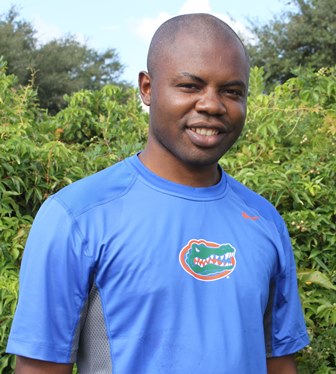 Aristide became interested in manatees during the first year of his master’s program at the University of Dschang in Cameroon. He learned that marine mammals, especially in his country, were understudied and little understood. After completing his master’s program, Aristide worked for three years studying zoonotic diseases with an American research organization based in Cameroon. He continued to study manatee distribution and founded a local organization called the African Marine Mammal Conservation Organization. The group continues to conduct research and conservation activities on manatees and dolphins along the coastal area of Cameroon, in collaboration with local fishermen.
Aristide became interested in manatees during the first year of his master’s program at the University of Dschang in Cameroon. He learned that marine mammals, especially in his country, were understudied and little understood. After completing his master’s program, Aristide worked for three years studying zoonotic diseases with an American research organization based in Cameroon. He continued to study manatee distribution and founded a local organization called the African Marine Mammal Conservation Organization. The group continues to conduct research and conservation activities on manatees and dolphins along the coastal area of Cameroon, in collaboration with local fishermen.
Aristide first heard of UF’s program in Aquatic Animal Health while attending a marine mammal conference in Gainesville in 2011. He was able to cultivate relationships with UF veterinarians and biologists and participated in manatee capture and health assessment activities at Crystal River. Impressed by all he learned and the people he met, Aristide chose UF over other places he could have studied, as he felt it was the ideal place to gain knowledge and expertise in manatee research and conservation.
After completing his Ph.D., he plans to return to Cameroon to relay the knowledge he received at UF to students and researchers interested in marine mammal sciences.
Forward Together,
David S. Guzick, M.D., Ph.D. Senior Vice President for Health Affairs, UF UF Health President
About the author
